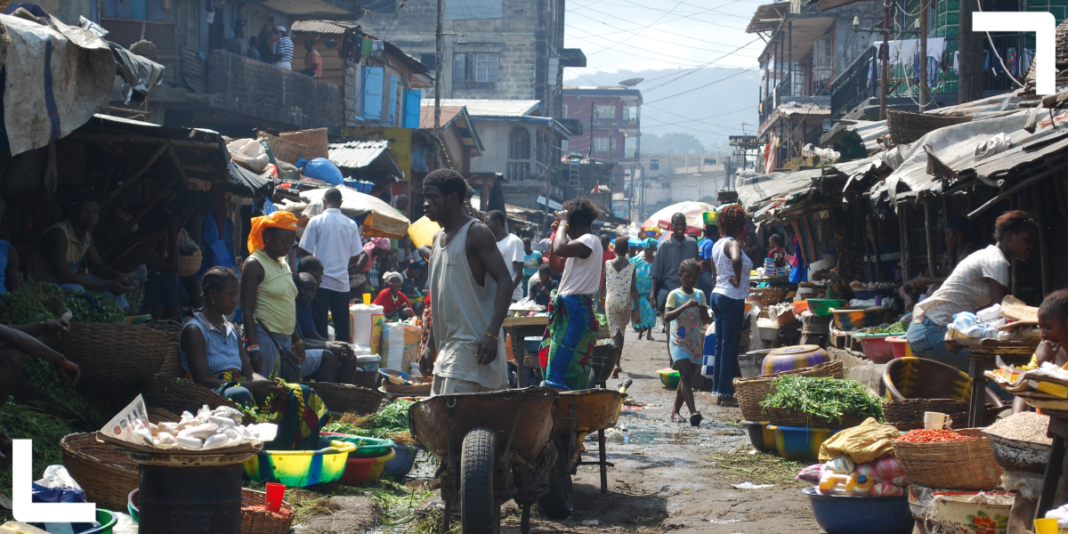By Aminata Sesay (Intern)
Youths unemployment has largely been described as a major catalyst for revolution, political and societal upheaval, and conflict towards the system and state. Today’s youth are well educated and represents the labour force of tomorrow. However, there are approximately 73 million unemployed youth globally and Sierra Leone is not an exception to this menace. This has resulted to increase in street trading in the municipality of Freetown. Street trading is defined as the selling or offering for sale of any article in the street.
Traders who use the public highway to sell goods or services must have a street trading license to carry out the trade from a designated site and display of goods in front of a shop. In some countries like the UK, people acquire license to be able to sell goods in the streets. Street trading is important for some people because of the lack of jobs and skills for young adults in the country. Some people engage in street trading because they believe they earn more in the streets than the market.
In Sierra Leone, street trading is considered to be illegal. Though people use it to put food on the table, it’s very risky. It always encourages criminals among the traders. However, despite efforts by the Freetown City Council to censor street-trading on major streets, traders continue to dominate the urban landscape. There are laws and bye-laws in the Local Government Act, which include No Street Trading on designated streets.
Even though the main reason for street trading is to earn a living, it has gotten out of hand especially in the Central Business District – CBD. Street trading in Sierra Leone is perceived as an economic activity for those with low educational level and highly dominated by young women and children since it is considered as extension of their productive and domestic roles.
The problem of unemployment of youths in Sierra Leone has generated this informal type of trading. There are some graduates that sell on the streets of Freetown because of unemployment. Hundreds of thousands of unemployed people in Freetown are eking out a meagre existence out of illegal street trading. Few are paying local council taxes, let alone declaring their income for personal taxation purposes.
Informal traders on Abacha Street and other informal markets across Freetown are often not registered and do not keep accounts or pay taxes on their businesses. However, informality does not always mean unregulated. Many informal traders pay taxes to local unions and are sometimes organised into associations.
In the Freetown Municipality, street trading has become a source of livelihood for many and also as an important source of accessible, convenient and affordable goods for the urban poor. For example, the street food sector provides accessible food items and makes life easy for the working class. Beyond this, the socioeconomic role of street trading in terms of its potential for employment and income generation has attracted many people, male and female, single and married, into this practice.
Many factors are responsible for street trading in Sierra Leone. Among them are: poverty, lack of law implementation, unemployment, lack of skills, etc.
As a result, the impact of street trading reaches out to the community and society in which the unemployed youths lives. Street trading in Freetown has mushroomed beyond control with grave consequences for road safety, public health and sanitation, street crime and environmental blight.
Accidents, untidiness and unpleasantly are also some impact of street trading in Sierra Leone. Apart from interrupting human and vehicular traffic, street trading also leaves the streets of Freetown littered with plastic bags, wrappers and other forms of waste. This makes our streets very dirty, untidy and unsightly. To control this chaos, the Freetown City Council (FCC) has put certain measures in place and embarked on operations to eradicate street trading and peddling especially from the CBD. The measures include payment of taxes for goods and also the acquisition of tickets by street traders to legitimise their trade. But these measures seem not to be working.
The eviction of street traders as a government policy dates back to the days of Alfred Akibo-Betts as Mayor of the Freetown City Council. Many people see the creation of more markets as a solution to street trading. It is assumed that more markets will give street traders a conducive and appropriate environment to do their businesses.
However, in Freetown and the other cities, curbing street trading will take much more than creating new markets because the business of street trading is much more an issue of survival as it is cultural. While the central government and Freetown City Council are making efforts to relocate Abacha Street traders and other street trading activities to the Sewa Ground Market, an alternative should have been provided on a rolling basis, to reduce the effects of food insecurity on those women’s households.
Finally, in curbing street trading in Sierra Leone, it is important for the government to create more job opportunities for the youth. From our findings, most of the traders selling along the streets are educated. Some learned skills, while others are graduates. But because of unemployment, they decided to sell on the streets of Freetown.
Another way is to enforce the policies on street trading. Of course there are policies on street trading in Sierra Leone; however, the authorities are not enforcing them. Also, the government must encourage training institutions to provide entrepreneurship training for these street traders which will enable them to grow and expand their business in safe/ designated areas. This may create employment for the youths and poverty eradication. The more job opportunities created the lesser the chances of street trading.
